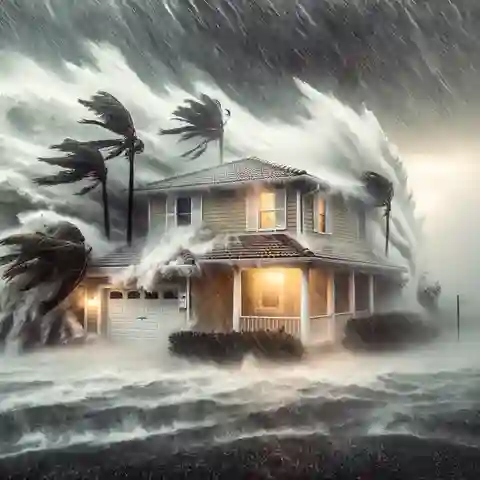South Florida homeowners insurance! If you live in South Florida, you know that owning a home comes with extra challenges. One big challenge is homeowners insurance. It costs more here than in most other places, but it’s super important to have!
Why South Florida Homeowners Insurance Is Different

Hurricanes and Severe Weather
- Florida: Hurricane Magnet: Florida gets hammered by hurricanes way more than most other states. Those storms bring crazy winds, flooding from the ocean, and buckets of rain that can wreck a house.
- The Price of Storms: After a big hurricane, insurance companies have to pay out a TON of money. To prepare for that, they charge everyone in storm-prone areas more for insurance.
- It’s Not Just Hurricanes: Even regular ol’ thunderstorms can do major damage if they’re strong enough. This all adds up for insurance companies, making them charge more.
Flood Risk
- Water Worries: Guess what? Your regular homeowners insurance won’t pay a dime if your house floods. In Florida, flooding is a big deal – from hurricanes, crazy rain, or even rivers overflowing.
- Flood Insurance = Must-Have: If you live in certain areas, your bank will probably make you buy separate flood insurance. That’s an extra cost on top of everything else!
- Don’t Think You’re Safe: Flooding can happen even in places that aren’t officially “high-risk”. If it rains hard enough, long enough… yikes! Flood insurance might be worth it to protect yourself.
Older Homes
- Old Codes, New Problems: Lots of Florida houses, especially near the beach, were built before the super-strong hurricane building codes existed. That means they might break easier in a storm.
- Fixing Gets Expensive: Older houses sometimes need special stuff when they’re repaired. That costs insurance companies more, so they might charge you more too.
High Demand, Limited Options
- Risky Business: All these problems make some big insurance companies say “Nope!” to selling insurance in South Florida. Less competition means less choice for you.
- Who’s Still Here? Companies that do offer insurance here might charge a lot or be super picky about who they cover.
- The State Steps In: Florida has a special back-up insurance company called Citizens. It’s for people who can’t get insurance anywhere else, but it’s often pricey and doesn’t cover as much.
It All Adds Up: The storms, the floods, and the mix of old and new houses make insuring a home in South Florida a tricky thing. That’s why it costs more and takes extra planning to make sure you’re protected.
What Impacts Your South Florida Homeowners Insurance Cost

Home Location & Risk Factors
- Beachfront = Bigger Bills: Homes directly on the coast are at the highest risk of hurricane damage. Insurance companies know this, so your premiums will reflect that risk.
- Flood Zone Worries: Your designated flood zone (you can find this on FEMA’s map) is huge. Higher-risk zones mean higher insurance costs, and often the requirement to buy separate flood insurance.
- Elevation is Everything: Even a few feet can make a difference in flood risk. Homes on higher ground may need less flood coverage or qualify for lower rates.
Home Characteristics
- Age Matters: Older homes may not have been built to the same hurricane-resistant codes as newer ones. This can make them more expensive to insure.
- The Stronger, the Better: Concrete block construction is sturdier than wood frame in a storm. Your roof type (hip roofs are good!) and materials all factor in.
- Upgrades = Potential Savings: Investing in hurricane shutters, a wind-resistant roof, or smart home leak detectors shows the insurance company you’re less risky, potentially reducing your premiums.
Coverage Choices
- The Deductible Dilemma: A higher deductible (what you pay out-of-pocket before insurance kicks in) lowers your monthly cost. But, make sure you can afford it if disaster strikes!
- Replacement vs. Cash Value: Replacement cost pays to rebuild your home with new materials. Cash value only pays its depreciated value, which may not be enough to rebuild after a major loss.
- Optional Add-Ons: Things like coverage for expensive jewelry or extra liability protection will increase your premiums.
Your Insurance History
- Claim-Free is Cheaper: A history of insurance claims makes you seem riskier to companies, leading to higher rates.
- Credit Matters (Sometimes): In some states, your credit score can be used in determining your rates. A good credit score could mean some savings.
Important Note: Insurance companies weigh these factors differently. That’s why it’s so important to compare quotes, as one company might care more about your roof type, while another focuses on your distance from the beach.
Extra Tip: Ask each insurance company you get quotes from what the biggest factors are in their pricing. This can help you target upgrades or coverage decisions that will save you the most!
Finding Affordable South Florida Homeowners Insurance

- Shop ‘Til You Drop (for Insurance): Don’t just take the first offer you get! Contact several insurance companies and compare their prices and what they cover. It takes a bit of work, but it could save you big bucks.
- The Deductible Deal: A deductible is the amount you pay out of pocket before your insurance kicks in. Choosing a higher deductible can lower your monthly premium (the regular bill you pay). But, make sure you can actually afford that higher deductible if disaster strikes!
- Bundle Up and Save: Sometimes, having your car insurance and homeowners insurance with the same company can get you a discount. Ask about this when getting quotes.
- Discount Hunter: Many companies offer discounts if you have things like hurricane shutters, a new roof, or a fancy security system. Ask each company what discounts they have!
- When the State Steps In: Florida has a special back-up insurance company called Citizens Property Insurance. It’s for when you can’t find normal insurance. However, it’s often more expensive and won’t cover as much stuff as a regular company.
Key Points:
- Effort Pays Off: Finding the best insurance deal in South Florida takes some work. But, the money you could save makes it totally worth it.
- Don’t Be Afraid to Ask: Insurance can be confusing! Ask your agent (or potential agents) to explain anything you don’t understand.
Additional Tips for South Florida Homeowners

Make Your Home Storm-Ready
- Hurricane Shutters or Impact Windows: These are a major defense against wind and flying debris Some insurance companies offer discounts for having them.
- Roof Upgrades: Ensure your roof is in good repair and consider upgrades like hurricane straps to strengthen its connection to your house. A newer, stronger roof may qualify for insurance discounts.
- Yard Cleanup: Trim trees, remove loose items, and secure anything that might become a projectile in high winds.
- Emergency Kit: Have a plan and supplies ready in case a storm forces you to evacuate or shelter in place. This won’t lower your insurance, but it’s vital for your safety!
Understand Your Flood Risk
- FEMA Flood Maps: The Federal Emergency Management Agency (FEMA) provides detailed flood maps. Search for your address on their website (https://msc.fema.gov/portal/home) to learn your flood zone and potential risk level.
- Elevation Matters: Even within flood zones, higher ground is less risky. Find out your home’s elevation, as this can impact your need for flood insurance and its cost.
- It’s Not Just Coastal: Flooding can happen far inland due to heavy rain and overflowing rivers. Don’t assume you’re safe if you don’t live near the beach!
Review Your Coverage Regularly
- Life Changes, Policy Changes: Did you renovate, add a pool, or buy expensive new belongings? Make sure your insurance coverage reflects the current value of your home and what’s inside it.
- Shop Around Again: Even if you’re happy with your company, it pays to get fresh quotes every few years. The insurance market changes, and a better deal might be out there.
- Ask Your Agent: A good insurance agent will review your policy with you and explain any changes you may need. Don’t be afraid to ask questions!
Extra Notes:
- Document Everything: Take photos and videos of your home and belongings for insurance purposes. Update these regularly, especially after major upgrades or purchases.
- Consider Flood Insurance: Even if you’re not in a high-risk flood zone, flood insurance can be a smart investment. Flood damage is often the most expensive kind after a storm.
Best and worst homeowners insurance companies in Florida
Let’s look at some popular choices and what they might be good for:
1. State Farm: A Good Starter Option Instead of “best for new homeowners,” try:
- Often has competitive rates for first-time buyers.
- Offers a variety of coverage options, so you can learn the basics.
2. Allstate: When You Want Extra Protection Avoid “best for extended coverage,” and instead say:
- Known for add-on policies to cover things your main insurance might not.
- Ask about their flood, windstorm, or even roof replacement options.
3. Progressive: The Bundling Bargain Hunter Not “best for bundling,” rather:
-
- Might be cheaper if you also get your car insurance through them.
- Always ask ANY company about bundling discounts!
4. Chubb: For Protecting Pricey Possessions Change “best for high-value homes” to:
- Specializes in insuring expensive homes and belongings.
- If you have fancy stuff, they might be a good fit.
5. Security First: The Hurricane Specialist Less about “best” and more like:
- Focuses on coastal areas and storm-related coverage.
- Good choice if you’re super worried about hurricane damage.
Important Reminder: Always compare quotes from several companies! What’s a great deal for your neighbor might not be the best for you.
It’s Complicated, But Important South Florida homeowners insurance can be confusing, but it’s too important to ignore. Do your research, be prepared, and you’ll find the best way to protect your home!

A renowned expert on tea parties, holds a deep understanding of the South Florida tea party scene and has extensive knowledge about tea parties across the globe.
With a rich background spanning several years, they have immersed themselves in the traditions, nuances, and cultural aspects of tea gatherings worldwide.
writings reflect a blend of firsthand experience and scholarly research, offering readers an authentic and comprehensive perspective on the world of tea parties.